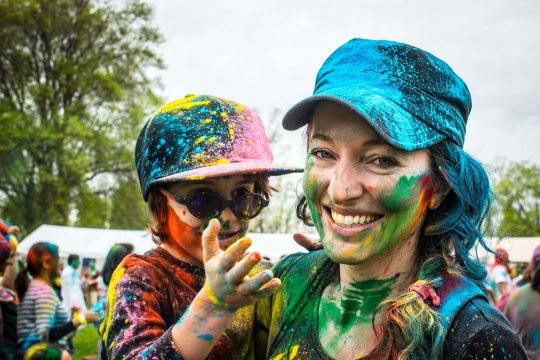Mum and her superpowers. Appreciating Mums, not just on Mother’s Day

Becoming a mum is an event that can turn the world upside down, even if we think we’re ready for it. It simply changes our life. This little being we have verifies our convictions and hopes. We handle motherhood differently, we have better and worse days, successes and parental failures. It comes with a whole range of new experiences and emotions. It’s an emotional roller coaster. From helplessness and fear when a toddler keeps crying all night, joy at the first step, nerves and outbursts of rage when a teenager rebels. To pride or surprise when seeing who our child grew to be.
Motherhood is a challenge
Becoming a mum is like a training ground and a minefield in one. You have to watch you and your child’s every step. You have pressurising expectations, good advice and criticism coming from your surroundings and from yourself. You also carrying your child’s world, often alone and you become their whole world too. All this, despite its charm, can be overwhelming. At some point you should let the child go on alone and let them make mistakes. Without this, they won’t learn important life lessons and how to deal with them. How can you handle all this? If this isn’t a real challenge and heroism, then what is?
We have superpowers – let’s appreciate ourselves
So, without undue modesty, appreciate the superpowers you have as a mum. Grasping what seems beyond reach, being an oracle, possessing all sorts of knowledge and having hands that sooth pain and fear. Talk to your child about heroes and let them see one in you. Recall people or characters who have acted heroically (e.g. from fairy tales, films, literature, etc.). What are their character traits, what distinguishes them? Who do you think a hero is? What are the qualities of a hero? Can anyone be a hero? Talk about them. Explain that a hero is not only a person who performs extraordinary acts, for example, saving others’ lives. Each of us can be a hero every day, because to be a hero, you don’t have to be big and strong, you only need a big heart. You can refer to the coronavirus and give examples of heroic doctors who treat patients despite difficult conditions and work for many hours, as well as examples of ordinary people who, for example, help the elderly by shopping for them.
Unleash the power of gratitude
Being a mum is a huge challenge. Like every challenge, it forces us to try, offering more skills and experiences in return. Take a look at your skills and experiences and think which ones you feel grateful for. Every day, think of a small thing that you can tell your child you are grateful to them for. There is a good chance that when a child hears that they have done something right, when they hear something positive about themselves, they’ll want to do it again. This helps children believe in themselves and start to notice their strengths. Maybe the child will share with you what they enjoy at the moment? What brings them joy currently? What happened to them today that was nice? Or what they did for someone that was kind? You can also write down your reasons for gratitude at home! Dear Mums, all the best today and every day! You deserve it!
All source materials are prepared by the team of Kulczyk Foundation’s Education Department in cooperation with teachers and experts – pedagogists, psychologists and cultural experts – and verified by an experienced family therapist Kamila Becker. Kinga Kuszak, PhD, Professor of Adam Mickiewicz University, Faculty of Educational Studies, provides content-related supervision over Kulczyk Foundation’s educational materials. All materials are covered by the content patronage of the Faculty of Educational Studies of Adam Mickiewicz University.
The article was published on 26.05.2020 on the website of Instytut Dobrego Życia (Good Life Institute)
Authors: Anna Samsel (Kulczyk Foundation) and Anna Woźniak (Instytut Dobrego Życia)

